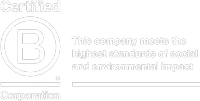Over the years I’ve watched the conversation around higher purpose in business steadily increase, which has been exciting, to say the least – our world has a tonne of problems to solve.
More than a decade ago when we first started developing a purpose-driven approach to our own business it was almost unheard of. We were told often that we ‘didn’t understand business’. Luke, Shane and I were in our early twenties when we started talking about doing business for good, and I remember more ‘experienced’ business people would fold their arms and grin sarcastically when we said we weren’t in business just to make money. It felt pretty intimidating at the time and we often questioned the path we were on because of it, but we kept going. Over the years some employees would say it was too idealistic to bring higher purpose to business, consultants would drop words like ‘tripwire’ and ‘profit maximisers’, and we’d cringe and send them on their way. We were definitely the minority in our beliefs around business.
But today you’d be forgiven for assuming that everyone was in business for a higher purpose – it’s talked about at networking events, it’s at the top of the priority list for CEO’s and CMO’s, and every second social post prompts us to lead from purpose. But what does that actually mean? I’ve asked a lot of business and marketing leaders what they think it means over the years, and I’ve heard mixed responses, from CSR and philanthropy to mission statements and values… all of these things are great, and definitely a positive move for a business, but none of them reflects purpose.
Purpose can’t be retrofitted. And it may not be for everyone. Slapping ’we’re here to save the world’ onto your About Us page, investing in a CSR initiative or announcing you now ‘put people first’ doesn’t make you a purpose-led company. Purpose and profit must genuinely coexist, you don’t use purpose to make a profit. If you’re interested in purpose because you think it will ‘make you more successful’ and ‘customers are demanding it’ then are you really interested in being purpose-led and part of the positive evolution of business? I think it’s more likely you’re jumping on a bandwagon.
But if you truly want to build a purpose-led business, how can you make sure it’s genuine and not just another marketing façade that people will see through?
After working with and speaking to leaders in purpose-led companies for years, and watching the highs and lows they go through, here’s what I’ve learned it truly means to be a purpose-led business:
- It’s bringing your origin to light. The real, authentic, deep-seated reason your business was started by its founder OR the genuine, collective positive future your business is contributing to.
- It’s discovering your unique, collective authenticity as a company.
- It’s setting aside the five-year projections and marketing plans for a minute and taking a look instead at how you actually want to contribute to the world. (What are you here to give, not just get?).
- It’s having the courage to stand for something, not playing safely on the sidelines in case you offend someone or ‘miss out on an opportunity’.
- It’s putting your higher-purpose at the centre of your business strategy, not just your profits. (How do you measure success?).
- It’s making decisions that put your purpose, and people, first.
- It’s saying no to the things that don’t reflect your core values.
- It’s working with a greater intention every day.
- It’s looking to your purpose as a guide for how your company conducts itself – from sourcing, recruiting, motivating, selling, everything.
- It’s working to embed rich meaning into your culture.
- It’s building something people can be a part of, not just a customer for.
- It’s servant leadership, not just good customer service.
- It’s actually giving a crap about what you’re doing and who you’re doing it with.
- It manifests over years, not overnight. It’s always a work in progress because universal betterment is in your DNA.
And the real cruncher:
- It’s sacrificing short-term personal gains for long-term collective gains.
- Or from a business perspective – it’s often sacrificing short-term wins for long-term collective betterment (yours, the people you serve, and society as a whole).
It often feels counter-intuitive, but that’s what being led by your purpose, not just profit, really means. In 2011, Patagonia blew the whistle on itself when it discovered human rights abuse within their manufacturing contractors. Many companies would have taken the head-in-the-sand approach and tried to hide the issue because it may be bad for profits, but Patagonia stayed true to their purpose which calls them to Build the best product, cause no unnecessary harm, use business to inspire and implement solutions to the environmental crisis. Previously, in 1994, they made the decision to replace conventional cotton (which involved heavy use of chemicals that caused environmental harm) in their clothing with 100% organic cotton. $20 million worth of sales were at stake, or 20% of their business, and they knew they’d face innumerable roadblocks in the supply chain, but they went ahead anyway.
On a different level, Zappos has trained its staff to find and direct customers to a competitors website if they don’t have their shoe size in stock. Why? Because their purpose is to always deliver happiness, and that takes precedence over short-term profit. They also offer new employees thousands of dollars to quit if they don’t align with the company values because they don’t want people who are there just for the paycheck. People who aren’t happy can’t deliver happiness. Read more of their story here.
Yes, a purpose may set you apart from the competition and help you stand out. It will more than likely result in better customer engagement and retention. Over time it’s been proven that it can make you more profitable. But these are the outcomes of a company that strives to walk the talk every day, who have a genuine purpose – not one that has been retrofitted or post-rationalised to make a buck.
Purpose is not a tactic. It’s bloody hard work. Every leader out there trying to build a purpose-led company can attest to that. There are no short cuts – it’s a long, challenging, sometimes gut-wrenching, but always rewarding, road. And despite what you’ve heard, this road isn’t crowded.
So how do you know if you have a genuine purpose?
If you’re a business owner I think a good start is to ask yourself ‘If my business closed down tomorrow, would my higher purpose still exist? Would I still pursue it some other way?’
Would you?








